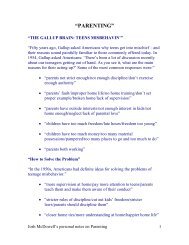Pdf Copy of Orthodoxy, by G.K. Chesterton - Christ United Methodist ...
Pdf Copy of Orthodoxy, by G.K. Chesterton - Christ United Methodist ...
Pdf Copy of Orthodoxy, by G.K. Chesterton - Christ United Methodist ...
Create successful ePaper yourself
Turn your PDF publications into a flip-book with our unique Google optimized e-Paper software.
9/ 27/ 12 The Pr oject G ut enber g eBook <strong>of</strong> O r t hodoxy, G . K. Chest er t on<br />
www. gut enber g. or g/ f iles/ 16769/ 16769- h/ 16769- h. ht m<br />
man must be interested in life, then he could be disinterested in his views <strong>of</strong> it. "My son give<br />
me thy heart"; the heart must be fixed on the right thing: the moment we have a fixed heart<br />
we have a free hand. I must pause to anticipate an obvious criticism. It will be said that a<br />
rational person accepts the world as mixed <strong>of</strong> good and evil with a decent satisfaction and a<br />
decent endurance. But this is exactly the attitude which I maintain to be defective. It is, I<br />
know, very common in this age; it was perfectly put in those quiet lines <strong>of</strong> Matthew Arnold<br />
which are more piercingly blasphemous than the shrieks <strong>of</strong> Schopenhauer—<br />
"Enough we live:—and if a life,<br />
With large results so little rife,<br />
Though bearable, seem hardly worth<br />
This pomp <strong>of</strong> worlds, this pain <strong>of</strong> birth."<br />
I know this feeling fills our epoch, and I think it freezes our epoch. For our Titanic purposes<br />
<strong>of</strong> faith and revolution, what we need is not the cold acceptance <strong>of</strong> the world as a<br />
compromise, but some way in which we can heartily hate and heartily love it. We do not<br />
want joy and anger to neutralise each other and produce a surly contentment; we want a<br />
fiercer delight and a fiercer discontent. We have to feel the universe at once as an ogre's<br />
castle, to be stormed, and yet as our own cottage, to which we can return at evening.<br />
No one doubts that an ordinary man can get on with this world: but we demand not strength<br />
enough to get on with it, but strength enough to get it on. Can he hate it enough to change it,<br />
and yet love it enough to think it worth changing? Can he look up at its colossal good<br />
without once feeling acquiescence? Can he look up at its colossal evil without once feeling<br />
despair? Can he, in short, be at once not only a pessimist and an optimist, but a fanatical<br />
pessimist and a fanatical optimist? Is he enough <strong>of</strong> a pagan to die for the world, and enough<br />
<strong>of</strong> a <strong>Christ</strong>ian to die to it? In this combination, I maintain, it is the rational optimist who fails,<br />
the irrational optimist who succeeds. He is ready to smash the whole universe for the sake <strong>of</strong><br />
itself.<br />
I put these things not in their mature logical sequence, but as they came: and this view was<br />
cleared and sharpened <strong>by</strong> an accident <strong>of</strong> the time. Under the lengthening shadow <strong>of</strong> Ibsen,<br />
an argument arose whether it was not a very nice thing to murder one's self. Grave moderns<br />
told us that we must not even say "poor fellow," <strong>of</strong> a man who had blown his brains out,<br />
since he was an enviable person, and had only blown them out because <strong>of</strong> their exceptional<br />
excellence. Mr. William Archer even suggested that in the golden age there would be pennyin-the-slot<br />
machines, <strong>by</strong> which a man could kill himself for a penny. In all this I found myself<br />
utterly hostile to many who called themselves liberal and humane. Not only is suicide a sin, it<br />
is the sin. It is the ultimate and absolute evil, the refusal to take an interest in existence; the<br />
refusal to take the oath <strong>of</strong> loyalty to life. The man who kills a man, kills a man. The man who<br />
kills himself, kills all men; as far as he is concerned he wipes out the world. His act is worse<br />
(symbolically considered) than any rape or dynamite outrage. For it destroys all buildings: it<br />
insults all women. The thief is satisfied with diamonds; but the suicide is not: that is his crime.<br />
He cannot be bribed, even <strong>by</strong> the blazing stones <strong>of</strong> the Celestial City. The thief compliments<br />
the things he steals, if not the owner <strong>of</strong> them. But the suicide insults everything on earth <strong>by</strong><br />
not stealing it. He defiles every flower <strong>by</strong> refusing to live for its sake. There is not a tiny<br />
creature in the cosmos at whom his death is not a sneer. When a man hangs himself on a<br />
40/ 100





